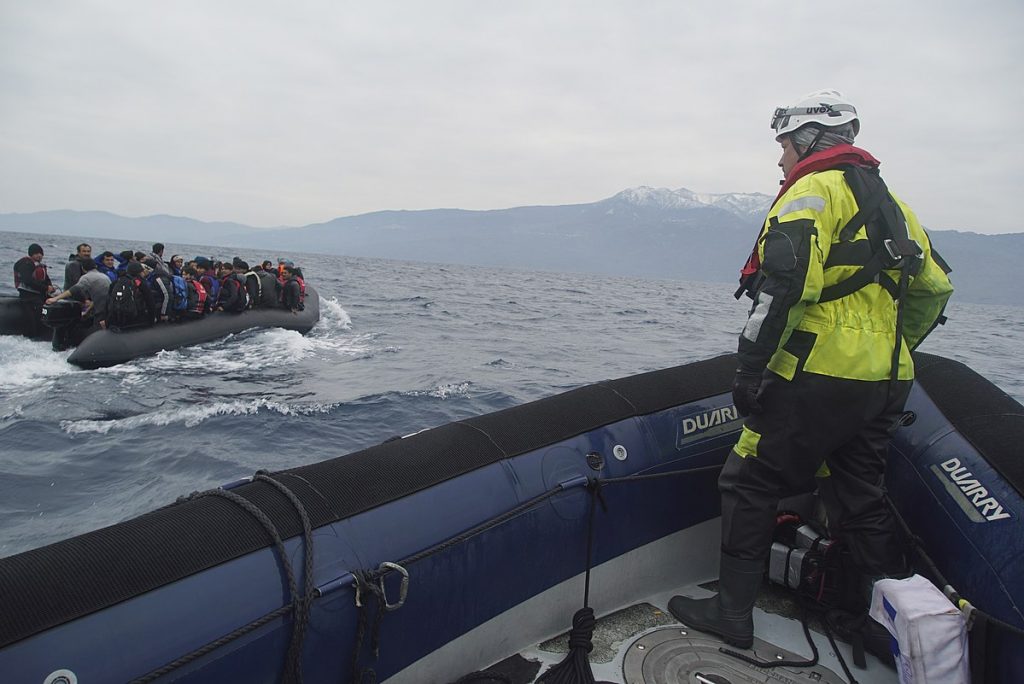
An article by Dr Jeff Crisp
Many of the world’s most powerful and prosperous states are taking steps to prevent refugees from seeking asylum on their territory and to contain them in developing countries. In this article, Jeff Crisp explains why and how such strategies should be resisted. As UNHCR recently wrote: “Externalization arrangements do not deter desperate refugees from taking perilous journeys to seek safety. Rather, they will magnify risks, prompt resort to alternative routes, and exacerbate pressures on frontline states”.
Obstructing refugee arrivals
According to the Universal Declaration of Human Rights, “everyone has the right to seek and to enjoy in other countries asylum from persecution.” But in recent years, the world’s most prosperous and powerful states have been challenging this principle by taking steps beyond their frontiers to obstruct or deter the arrival of refugees from countries of the Global South. Such remote control measures are often referred to as ‘externalization’.
The interception of asylum seekers travelling by boat, before detaining and processing them in offshore locations, is one of the best known forms of this strategy, as is the establishment of deals between wealthier and poorer states, with the latter being offered financial aid and other incentives in return for their cooperation in blocking the onward movement of refugees.
The remote control or externalization strategy has also been manifested in other ways, including the imposition of visa controls and carrier sanctions, the outposting of immigration controls at foreign ports and airports, as well as the use of publicity campaigns and information programmes designed to deter people from leaving their homeland or country of first asylum.
The distinctive feature of such measures is that they take place beyond the territorial borders of the countries responsible for them and that they require the cooperation of other (and usually less powerful) states. In this respect, unilateral and exclusionary strategies such as the erection of new frontier fences, the deployment of military and militia forces to border areas and ‘push-backs’ of refugees arriving by boat cannot be considered as forms of externalization.
The history of remote control
While the notion of externalization is a recent one, this strategy is not new. In the 1930s, maritime interceptions were undertaken by several states to prevent the arrival of Jews escaping from Nazism. In the 1980s, the US introduced interdiction and offshore processing arrangements for asylum seekers from Cuba and Haiti, while in the 1990s, the Australian government introduced the ‘Pacific Solution’. Under this arrangement, asylum seekers who intended to arrive and settle in that country were intercepted and banished to detention centres in the impoverished and aid-dependent island states of Nauru and Papua New Guinea.
While this approach reduced the number of people making their way to Australia by boat, it has entailed serious physical hardship and extreme psychological harm for the people concerned, many of whom have had to be relocated to Australia for medical treatment. To make things even worse, any asylum seeker who has been sent offshore and is subsequently found to meet the criteria for refugee status has been refused permission to settle in Australia, even if they have family members living there.
Over the past two decades, the European Union (EU) has become increasingly eager to adapt the Australian approach to the European context. Indeed, the notion of externalization formed the basis of the EU’s 2016 deal with Turkey, whereby Ankara agreed to block the onward movement of Syrian and other refugees, in exchange for financial support and other rewards from Brussels, including the prospect of visa-free travel for Turkish citizens.
Since then, the EU has also provided vessels, equipment, training, and intelligence to the Libyan coastguard, giving it the capacity to intercept, return and detain anyone trying to cross the Mediterranean by boat. At the same time, the Trump and Biden administrations have used their diplomatic and financial leverage to co-opt Mexico and the states of Central America in obstructing the northward movement of refugees from within and beyond the region.
Looking to the future, remote control appears likely to become the defining characteristic of asylum policy in the Global North. After fruitless discussions with countries such as Albania, Ghana, and Kenya, for example, the UK government has recently announced that any asylum seeker arriving in the country by means that are considered to be ‘illegal’ and whose application for asylum in the UK is deemed ‘inadmissible’ may be forcibly transferred to Rwanda, where they will be obliged to remain, even if their claim to refugee status is recognized by the authorities in Kigali. Inthis respect, the UK has abandoned any responsibility for the asylum seekers arriving on its territory.
Denmark is keen to establish a similar arrangement, raising the question as to whether other EU countries will try to follow suit. Unsurprisingly, the UK has remained silent with respect to Rwanda’s poor human rights record, the extent to which refugees who are sent to that country will be able to support themselves, and the compatibility of this arrangement with the obligations that the country has freely assumed as a signatory to the UN Refugee Convention.
Negative consequences
While externalization strategies have proved extremely expensive to implement, states in the Global North believe that this is a price worth paying because it limits the number of asylum seekers arriving on their territory and sends a clear signal to their electorates that they are doing something to curb refugee arrivals and are prepared to act tough on the issue of unauthorized migration.
In other respects, however, externalization has had a wide range of negative consequences. It has enabled the world’s most prosperous states to avoid the obligations that they have freely accepted as parties to the 1951 UN Refugee Convention and prevented people from exercising their right to seek refuge in another state. It has also normalized state brutality and subjected refugees to serious human rights violations, including extreme forms of physical and psychological harm.
This has been witnessed most clearly in Libya, where refugees who have been intercepted at sea and returned to the country by the EU-supported Coast Guard have been subjected to arbitrary and indefinite incarceration in abusive detention centres where torture, forced labour and sexual violence are rife. Although the UN Secretary-General has regularly reported on these human rights violations, neither the Libyan authorities nor the EU have taken the necessary steps to stop them from occurring.
By closing borders, externalization has encouraged refugees to undertake risky journeys involving human smugglers, traffickers, and corrupt government officials. It has placed a disproportionate burden on developing countries, where 85 per cent of the world’s refugees are to be found. As seen most starkly in the EU-Turkey deal, it has encouraged the use of refugees as bargaining chips, with less-developed countries extracting funding and other concessions from wealthier states in exchange for restrictions on refugee rights.
Finally, the implementation of remote control measures has encouraged the states responsible for them to speak in disingenuous and dishonest ways, refusing to acknowledge the unethical treatment of refugees and disregarding the fact that their actions violate basic refugee protection principles, such as the right to seek asylum and responsibility-sharing. In this respect, the world’s wealthiest states, which played a leading role in the establishment of the international refugee protection regime, are taking a lead in dismantling it.
The Global Compact on Refugees
Given its many negative consequences for people in need of protection, one might expect the notion of externalization to feature prominently in the Global Compact on Refugees, a multilateral agreement formulated by states and the UN between 2016 and 2018 with the intention of reinvigorating the international refugee protection regime. Unfortunately, it does not.
The Global Compact does not contain a section or even a paragraph devoted to externalization, the right to seek asylum in other states or the use of extraterritorial measures designed to prevent refugees from exercising that right. Some of the key words associated with the externalization process – such as ‘interception and return’ and ‘offshore processing’, do not appear in the document at all.
The Global Compact talks about “an urgent need for more equitable sharing of the burden and responsibility for hosting and supporting the world’s refugees,” and calls for “mechanisms for the fair and efficient determination of individual international protection claims,” but it does not point out how such objectives are undermined by the remote control measures introduced by the world’s wealthiest states.
More generally, the Global Compact assumes that the vast majority of the world’s refugees will remain in the Global South, and that the key challenge for the international community is to support them and their host communities with more effective humanitarian assistance and development aid.
As a recent evaluation undertaken by the Danish Refugee Council concludes, states in the Global North regard the Global Compact as a strategy for addressing refugee situations in the Global South, while their own asylum policies have increasingly become subordinated to the task of migration management. “Denmark’s recent pursuit of the externalization of asylum procedures,” it concludes, “illustrates the growing disconnect between strong donor support for the Global Compact in relation to refugees and host communities abroad, and a different agenda at home, which frequently undermines the international protection regime.”
UNHCR’s position
What has UNHCR, the UN’s refugee agency and guardian of the 1951 Refugee Convention, had to say about the issue of remote control asylum policies?
In 2019 I undertook an extensive review of UNHCR statements, speeches, and documents, and came to the conclusion that the organization had failed to respond to the challenge of externalization by adopting a clear position, issuing a formal policy statement or even publishing a discussion paper on the issue.
One can only speculate why. My own view is that UNHCR was feeling seriously intimidated by the Trump administration’s overtly hostile attitude towards refugees and the UN, and that it might be confronted with funding cuts of the type already inflicted on WHO and UNRWA. Confronted with such threats, the organization’s natural inclination was to look for financial and diplomatic support from the EU, the very body that was, in the wake of the 2015-16 European refugee emergency, leading the headlong rush into the externalization of asylum policy. Unsurprisingly, in these circumstances, the organization chose to adopt a muted approach to the issue.
That situation has changed considerably in the past two years. Thus in October 2020, the High Commissioner spoke of “UNHCR’s and my firm opposition to the externalization proposals of some politicians, which are not only contrary to the law, but offer no practical solutions to the problems that force people to flee.”
In 2021, the Assistant High Commissioner for Protection began to speak much more freely on the issue. Citing Denmark and the UK as specific examples, she observed that “UNHCR is absolutely dismayed that some of our strongest supporters historically are now playing with this idea of externalizing their responsibilities.” Describing externalization as a form of neocolonialism (radical language for a senior UN official) she stated, “what we are finding is that Western, developed and wealthy countries are now not sharing responsibilities but shifting burdens to poor countries.”
In the same year, UNHCR published a formal note on externalization, while most recently, a member of the organization’s Department of International Protection published an article on the issue. It concluded by saying, “in addition to being legally flawed, practices which effectively deny or shift responsibility from the responsible state are likely to prove ineffective and unsustainable. Refugees who are denied access to the means to seek and enjoy protection will not find solutions and may be compelled to resort to irregular movement at the hands of unscrupulous smugglers or be exposed to trafficking, hardship, and denial of their rights.”
That is an unambiguously strong statement, although it is somewhat belied by UNHCR’s reluctance to make any direct and public criticism of the EU’s involvement in the interception, return and detention of refugees attempting to leave Libya by boat. Similarly, the organization has remained silent with respect to the regular interception and return of Cuban and Haitian asylum seekers hoping to reach the US state of Florida by sea. At the same time, the new UNHCR position with respect to remote control does not appear to have had any substantive impact on the asylum policies of its leading proponents in the Global North.
Looking to the future, the UK’s deal with Rwanda will provide a severe test of the organization’s policy in this domain. While UNHCR has been unequivocal in its condemnation of the arrangement, it can be assumed that both the UK and Rwanda will be eager to get the agency involved in its implementation, thereby legitimizing the deal. Will UNHCR be able to resist these pressures?
Alternatives to remote control
The scenarios analyzed above raise several important questions. First, can opposition to remote control be effective, or do we have to accept externalization processes as an unfortunate fait accompli? More specifically, what advocacy and litigation strategies might best be used in relation to externalization, especially by civil society?
Can protests and demonstrations of the type recently witnessed in Indonesia, Libya, and Tunisia, where refugees are demanding immediate evacuation and long-term solutions to their plight, do anything to halt the process of externalization, or could they lead to a hardening of attitudes amongst the states concerned? And how can UNHCR be persuaded to strengthen its position on the issue?
Second, are there any ways in which these externalization processes and the massive resources devoted to them might be used to improve the situation of refugees in the Global South? If they could be assured of decent accommodation, education, healthcare, and jobs in countries of first asylum and transit, would they be less inclined to embark upon difficult, dangerous, and expensive journeys to the industrialized states?
Finally, to what extent do safe and legal routes to asylum – or ‘complementary pathways’ as they are referred to by UNHCR – provide a humane and rights-based alternative to remote control? In the past few years, there has been growing international interest in enabling refugees to move by means of family reunion programmes, educational scholarships, labour migration opportunities, humanitarian visas and community-based resettlement programmes. If such pathways could be provided at sufficient scale, refugees might be less inclined to travel in an unauthorized manner and the rationale for remote control could thereby be challenged.
For further details of ’remote control’ and ‘externalization’, see the special issue of ‘Forced Migration Review dedicated to this topic.











